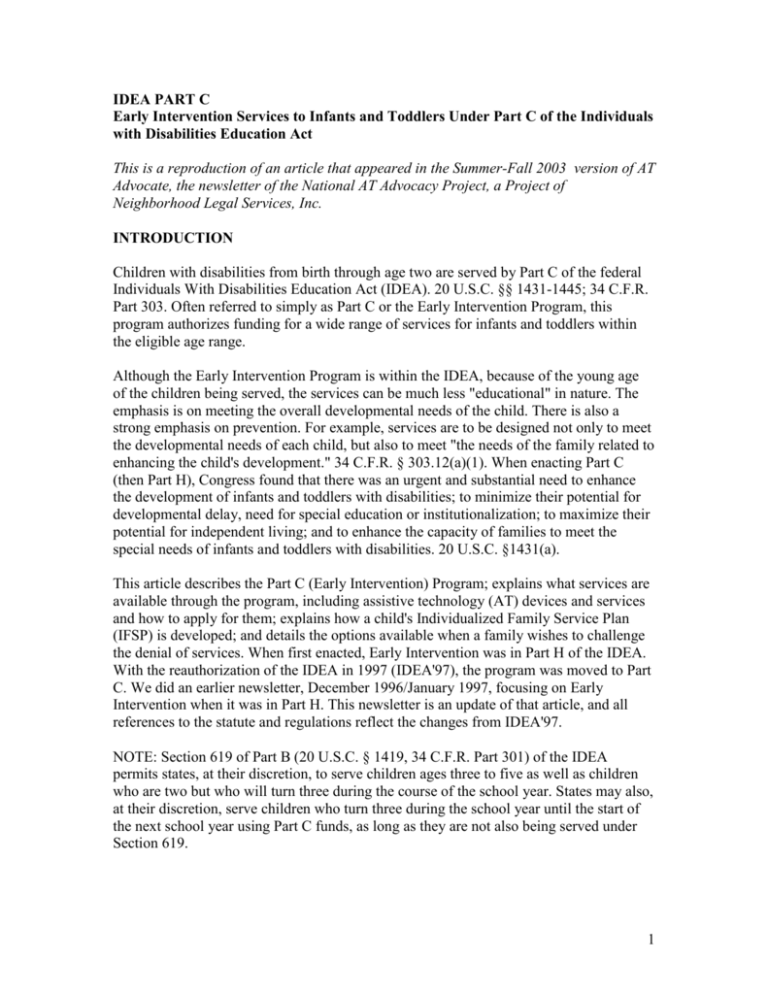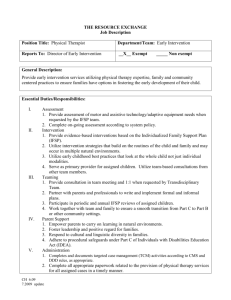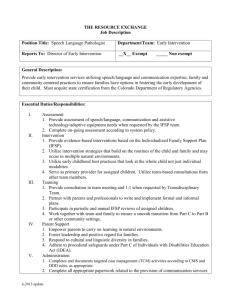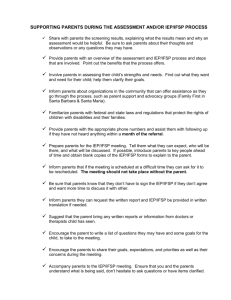IDEA PART C - RESNA Catalyst Project
advertisement

IDEA PART C Early Intervention Services to Infants and Toddlers Under Part C of the Individuals with Disabilities Education Act This is a reproduction of an article that appeared in the Summer-Fall 2003 version of AT Advocate, the newsletter of the National AT Advocacy Project, a Project of Neighborhood Legal Services, Inc. INTRODUCTION Children with disabilities from birth through age two are served by Part C of the federal Individuals With Disabilities Education Act (IDEA). 20 U.S.C. §§ 1431-1445; 34 C.F.R. Part 303. Often referred to simply as Part C or the Early Intervention Program, this program authorizes funding for a wide range of services for infants and toddlers within the eligible age range. Although the Early Intervention Program is within the IDEA, because of the young age of the children being served, the services can be much less "educational" in nature. The emphasis is on meeting the overall developmental needs of the child. There is also a strong emphasis on prevention. For example, services are to be designed not only to meet the developmental needs of each child, but also to meet "the needs of the family related to enhancing the child's development." 34 C.F.R. § 303.12(a)(1). When enacting Part C (then Part H), Congress found that there was an urgent and substantial need to enhance the development of infants and toddlers with disabilities; to minimize their potential for developmental delay, need for special education or institutionalization; to maximize their potential for independent living; and to enhance the capacity of families to meet the special needs of infants and toddlers with disabilities. 20 U.S.C. §1431(a). This article describes the Part C (Early Intervention) Program; explains what services are available through the program, including assistive technology (AT) devices and services and how to apply for them; explains how a child's Individualized Family Service Plan (IFSP) is developed; and details the options available when a family wishes to challenge the denial of services. When first enacted, Early Intervention was in Part H of the IDEA. With the reauthorization of the IDEA in 1997 (IDEA'97), the program was moved to Part C. We did an earlier newsletter, December 1996/January 1997, focusing on Early Intervention when it was in Part H. This newsletter is an update of that article, and all references to the statute and regulations reflect the changes from IDEA'97. NOTE: Section 619 of Part B (20 U.S.C. § 1419, 34 C.F.R. Part 301) of the IDEA permits states, at their discretion, to serve children ages three to five as well as children who are two but who will turn three during the course of the school year. States may also, at their discretion, serve children who turn three during the school year until the start of the next school year using Part C funds, as long as they are not also being served under Section 619. 1 WHAT IS THE EARLY INTERVENTION PROGRAM? Part C requires each state to develop a "statewide, comprehensive, coordinated, multidisciplinary, interagency system that provides early intervention services for infants and toddlers with disabilities and their families." 20 U.S.C. § 1431(b); 34 C.F.R. § 303.1(a). Each state must designate a lead agency, which bears responsibility for overall implementation, administration and monitoring of the Early Intervention Program. 20 U.S.C. § 1435(10); 34 C.F.R. § 303.142. Unlike Part B, the lead agency is not necessarily the state education agency. Although a number of public agencies may be involved in delivering services, the lead agency must also have a procedure in place to ensure that services are provided in a timely manner pending resolution of any disputes between those agencies or the service providers. 20 U.S.C. § 1435(a)(10)(D), 34 C.F.R. § 303.525. To be eligible for services a child must meet the age requirement and need early intervention services because the child has a developmental delay(s) in one or more of the following areas: cognitive development physical development (including vision and hearing) communication development social or emotional development adaptive development and/or has a diagnosed physical or mental condition which has a high probability of resulting in developmental delay. The criteria for eligibility may also include, at a State's discretion, at-risk infants and toddlers. 20 U.S.C. §1432(5); 34 C.F.R. § 303.16 ("AT-RISK INFANT OR TODDLERThe term ‘at-risk infant or toddler' means an individual under 3 years of age who would be at risk of experiencing a substantial developmental delay if early intervention services were not provided to the individual." 20 U.S.C. § 1432(1)). Each state must specify the criteria by which it measures developmental delay. 20 U.S.C. §1435(a)(1); 34 C.F.R. § 303.161. LIMITATIONS ON FEES OR COSTS All services under the Early Intervention Program must be provided at no cost unless federal or state law allows for payment by families, and states may establish a sliding scale of fee payments. 20 U.S.C. § 1432(4)(B); 34 C.F.R. § 303.12(a)(3)(iv). However, if the state guarantees a free appropriate public education from birth, the state may not charge parents for any services required under that state law which are provided to children eligible for early intervention services. Id. § 303.521(c). Each state must establish a policy concerning payment of fees, if any. Id. § 303.520(a). Such a policy may not allow fees for services a child would otherwise be entitled to receive at no cost and the parents' inability to pay for services cannot result in the denial of services to the child or family. Id. § 303.520(b)(3)(i) and (ii). 2 Moreover, the following services must be provided at no cost: Implementation of the State's child find requirements Evaluations and assessments Service coordination The development, review and evaluation of the IFSP Procedural safeguards Id. § 303.521(b). For all other services, including AT devices and services, the Part C program is the payer of last resort. 20 U.S.C. § 1440(a). Although the child need not be eligible for Medicaid to obtain services under Part C, if available the child's Medicaid or private insurance may be used to pay for early intervention services. Id.; 34 C.F.R. § 303.527(a). To prevent the delay of services, however, early intervention funds may be used to pay for services pending payment by the ultimate entity responsible. Id. § 303.527(b)(1). THE PROCESS BEGINS WITH A REFERRAL As part of its required comprehensive child find system, each state must develop and publicize its procedures for referring children for early intervention services. 20 U.S.C. § 1435(a)(6); 34 C.F.R. § 303.320. Parents who believe their child needs early intervention services may make the referral directly. The list of others who may make referrals is very broad. Id. § 303.321(d)(3). THE SERVICE COORDINATOR Once a child has been referred to the Early Intervention Program, a service coordinator must be appointed by the agency implementing the program. Id. § 303.321(e)(1). The service coordinator is responsible for overall implementation and coordination of the early intervention services to be provided, and must be from the profession most relevant to the child or family's needs or otherwise qualified to carry out all of his or her responsibilities. 20 U.S.C. § 1477(d)(7); 34 C.F.R. § 303.344(g)(1). The service coordinator's role is an ongoing and active one, designed to be a single point of contact for the family to ensure that they receive all the rights and services to which they are entitled. It is the duty of the service coordinator to be "continuously seeking the appropriate services and situations necessary to benefit the development of each child" throughout the child's eligibility. Id. § 303.23(a)(3)(iv). The specific duties of the service coordinator include: Coordinating the evaluation process Facilitating and participating in the development, review, and evaluation of IFSPs Assisting families in identifying available service providers Coordinating and monitoring the delivery of available services Facilitating the development of a transition plan to preschool services, if appropriate Coordinating with medical and health providers 3 Informing families of the availability of advocacy services Id. § 303.23 (b). SPECIFIC SERVICES AVAILABLE ARE VERY BROAD Services must be designed to meet the developmental needs of the child and the needs of the family and are to be selected in collaboration with the parents. Id. § 303.12(a). To the maximum extent appropriate for the child, services are to be provided in a natural setting, such as the home or a day care center. 20 U.S.C. § 1432(4)(G); 34 C.F.R. § 303.12(b). Services available through the Early Intervention Program include: Family training, counseling, and home visits Special instruction Speech-language pathology and audiology services Occupational therapy Physical therapy Psychological services Service coordination services Medical services only for diagnostic or evaluation purposes Early identification, screening, and assessment services Health services necessary to enable the infant or toddler to benefit from the other early intervention services Social work services Vision services AT devices and AT services Transportation and related costs that are necessary to enable an infant or toddler and the infant's or toddler's family to receive another service 20 U.S.C. § 1432(4)(E); 34 C.F.R. § 303.12(d). ASSISTIVE TECHNOLOGY IS COVERED Both AT devices and services are available under the Early Intervention Program and have the same definitions as they do for preschool and school aged special education programs. An "AT device" is any item or piece of equipment "that is used to increase, maintain, or improve the functional capabilities of a child with a disability." An "AT service" is "a service that directly assists a child with a disability in the selection, acquisition, or use of an assistive technology device." It also includes training or technical assistance for professionals, the individual or, where appropriate, the family. 20 U.S.C. §1401(1) and (2); 34 C.F.R. 303.12(d)(1). 4 Some examples of AT devices used by infants and toddlers: Manual or power wheelchairs Specialized strollers or car seats to accommodate the needs of a child with a disability Specially adapted toys and recreation equipment Augmentative communication systems Assistive listening devices including hearing aids, personal FM units and closed caption TV Assistive feeding devices including electric feeders There is an Office of Special Education Programs (OSEP) letter that addresses assistive technology for Part C (at that time Part H) eligible children. In Letter to Anonymous, 21 IDELR 1126 (November 30, 1993), OSEP clarifies that AT and audiology services must be provided to an eligible child only if they are determined to be relevant to meeting the developmental needs of the child and the needs of his/her family – an analysis that is to be done on a case-by-case basis in connection with the development of the IFSP. A COMPREHENSIVE, MULTIDISPLINARY EVALUATION IS REQUIRED Once a referral is received, there must be a timely, comprehensive, multidisciplinary evaluation designed to identify the "the child's unique strengths and needs and the services appropriate to meet those needs; and the resources, priorities, and concerns of the family and the supports and services necessary to enhance the family's capacity to meet the developmental needs of their [child]." 34 C.F.R § 303.322(a)(1) and (b)(2). The evaluation must include a review of health and medical records and an assessment of the functioning level and unique needs of the child in each of the following areas of development: cognitive, physical, communication, social and emotional, and adaptive behavior. Id. § 303.322(c)(3). The multidisciplinary evaluation must be nondiscriminatory and in the family's native language or "other mode of communication, unless it is clearly not feasible to do so." Id. § 303.323. A "Family Assessment" must also be offered to help identify the concerns, resources and strengths of the family. However, this assessment is voluntary on the part of the family, id. § 303.322(d), and protections for the family are included in the regulation. If the child or family needs immediate services, they may be available before an evaluation takes place. In such a case, an interim IFSP must be developed. The interim IFSP lists the early intervention services that have been determined to be necessary immediately and identifies a service coordinator to be responsible for implementing it. Id. § 303.345. This allows the child and family to receive services until the evaluation is completed and a final IFSP is written. 5 DEVELOPING THE IFSP If the evaluation team determines that a child is eligible for services, an Individualized Family Service Plan (IFSP) meeting will be held at a time and place convenient for the parents. 20 U.S.C. § 1436; 34 C.F.R. § 303.342(a) and (d)(1)(i). The meeting will be attended by the evaluator, the service coordinator, service provider(s), as appropriate, and the parents, along with any other persons the parents invite, including an advocate. Id. § 303.343(a). At the IFSP meeting, the same service coordinator as the one who handled the evaluation process may be assigned for ensuring implementation of the IFSP or a new service coordinator may be selected. Id. § 303.344(g)(2). The name of the service coordinator must be listed on the IFSP. Id. § 303.344(g)(1). The IFSP meeting must be held no later than 45 days after the early intervention official receives the referral. Id. § 303.321(e)(2). The IFSP must be in writing and include: The Child's Current Level of Development: including current level of physical development (including vision, health and hearing), cognitive development, communication development, social or emotional development, and adaptive development, based on professionally acceptable objective criteria. Family information: If the family agrees, a statement of the family's resources, priorities, and concerns related to enhancing the development of the child. Outcomes: a statement of the major outcomes the child and family are expected to achieve, and how progress toward the outcomes will be evaluated. Services: a statement of the specific early intervention services necessary to meet the unique needs of the child and the family, including the frequency, intensity, and method of delivering the services, the natural environments, the location of the services, and the payment arrangements, if any. Other Services: Such as medical services that the child needs but that are not required under Part C, and the funding sources to be used in paying for those services. Service Coordinator: The name of the service coordinator assigned to the child. Service Provision: The projected dates for initiation of the services and anticipated duration of services. Transition: A plan for transition from Part C services to preschool services under Part B, or other services that may be available to the child. 20 U.S.C. § 1436(d); 34 C.F.R. § 303.344. Parents must give informed written consent before services may begin. If there is not agreement on all services, only agreed upon services will be provided. 20 U.S.C. § 1436(e); 34 C.F.R. § 303.342(e). Services must be initiated "as soon as possible" after the IFSP meeting. Id. § 303.344(f). The IFSP must be reviewed at least every six months and evaluated at least annually at an IFSP meeting. 20 U.S.C. § 1436(b); 34 C.F.R. § 303.342(b) and (c). Additionally, the parents may request a review of the IFSP at any time. Id. § 303.342(b)(1). 6 THE TRANSITION TO SPECIAL EDUCATION SERVICES A transition plan must be developed to support and prepare the child and family for the time when the child will be too old to receive early intervention services. With parental consent, a meeting to review preschool eligibility must be held at least 90 days before the child becomes eligible for preschool special education services. If the child is not thought to be eligible for preschool special education, the district must make reasonable efforts to convene a conference among the lead agency, the family, and providers of other services to discuss the other appropriate services that the child may receive. See id. § 303.148. The parents must give permission before any records such as evaluations or the IFSP are sent to the school district. Id. C.F.R. § 303.344(h)(2)(iii). For children eligible for preschool special education, the transition planning process must include "mechanisms to ensure the uninterrupted provision of appropriate services to the child." Id. § 303.344(h)(2)(iii), Note. THE RIGHT TO APPEAL Parents must be informed of their appeal or due process rights throughout the process. They are entitled to written notice a reasonable period of time before there is a proposal or refusal to "initiate or change the identification, evaluation, placement" or provision of early intervention services. 20 U.S.C. § 1439(6); 34 C.F.R. § 303.403(a). The notice must describe the action and reasons for it and include due process rights. Id. § 303.403(b). The notice must be in the native language or dominant method of communication of the parents (including sign language, Braille or oral communication). Id. § 303.403(c). The parents also have the right to confidentiality of records and the right to review and inspect records concerning the child and family. 20 U.S.C. §1439(2) and (4); 34 C.F.R. § 303.402. An appeal can be pursued to resolve disagreements concerning any matter to which the parents were entitled to notice. 20 U.S.C. § 1439(1); 34 C.F.R. § 303.420. Parents may request mediation (20 U.S.C. § 1439(8)), an impartial hearing or file a system complaint. However, if mediation is offered, it must be voluntary and cannot be used to delay or deny a parent's rights, including the right to have a decision within 30 days. 34 C.F.R. § 303.420, Note 2. The Impartial Hearing Each State must develop an administrative process for resolving complaints through impartial hearings. States may adopt the due process procedures under Part B, the preschool and special education provisions. In such circumstances, the status quo protection must be provided consistent with the requirements of Part C, discussed below. States may also develop a separate administrative process, as set forth below. 34 C.F.R. § 303.420. Once a hearing has been requested, an impartial hearing officer will be appointed. The hearing officer must have knowledge about the law and familiarity with the needs of and 7 services for children and their families. Id. § 303.421. The hearing officer must make a written decision, including findings of fact and conclusions of law, within 30 calendar days of receipt of the request by the early intervention agency. Id. §§ 303.421(a)(2)(ii), 303.422(b)(5), 303.423(b). A verbatim record of the hearing must be made. Id. § 303.422(b)(4). The hearing must be scheduled at a "time and place that is reasonably convenient to the parents." Id. § 303.423(a). Parents have the right to bring an attorney or other person with special knowledge or training on early intervention. Parents have the right to present evidence, cross-examine, and compel the attendance of witnesses. The parents have the right to exclude any evidence not disclosed to them at least five days before the hearing. Id. § 303.422(b)(3). Either party may file an appeal in state or federal court. In such cases, as under Part B, the court is to receive the administrative record, hear additional evidence on request and render a decision based on the preponderance of the evidence. 20 U.S.C. § 1439(1). There is no provision for attorney's fees under Part C, but such a right may exist under state law. Additionally, the rights available under Part C are potentially enforceable under 42 U.S.C. § 1983, which has its own attorney's fees provision, 42 U.S.C. § 1988. See Marie O. v. Edgar, 1996 WL 48515, 14 A.D.D. 871 (N.D.Ill. Feb 02, 1996) Aff'd Marie O. v. Edgar, 131 F.3d 610 (7th Cir. 1997). (State of Illinois was not in "meaningful compliance" with then Part H, due to significant waiting lists and delays in obtaining services.) Once a hearing is requested, the child is entitled to receive all of the services that are not in dispute, and to continue to receive any services already being provided, until a decision is made by the hearing officer or until an appeal to court is concluded. 20 U.S.C. § 1439(b); 34 C.F.R. § 303.425. Moreover, parents have the right to decline a service or withdraw their consent to a service without jeopardizing their right to receive other services. 20 U.S.C. § 1439(3); 34 C.F.R. § 303.405. System Complaints A complaint may also be filed with the lead State agency implementing Part C for individual or systemic violations. The complaint may be filed by either an individual or organization. Id. §§ 303.510, 303.511. Some examples of systemic violations include: Charging for evaluations Providing services without parental consent Refusing to consider serving children in natural settings Not meeting the time requirements for evaluations or developing IFSPs. 8 CONCLUSION The Early Intervention Program can provide children with disabilities the services they need to get them started on the right track and minimize their need for special education services later in life. In many cases this program should be available to fund AT, particularly where no other funding source is available to purchase the equipment in question. National Assistive Technology Advocacy Project Neighborhood Legal Services, Inc. 295 Main Street, Room 495 Buffalo, New York 14203 Tel. (716) 847-0650; fax 716-847-0227 TDD (716) 847-1322 web site: www.nls.org 9





